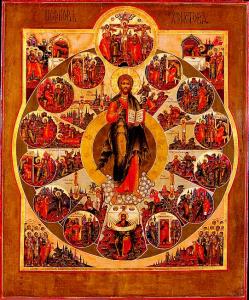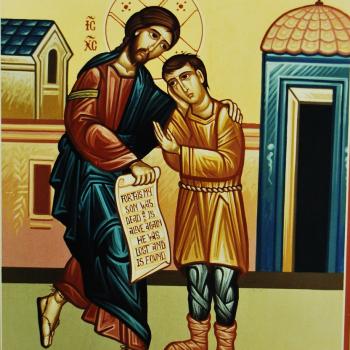
As a theologian, Joseph Ratzinger promoted a hopeful eschatological vision. He explained that humanity has a common origin, even as they have a common destiny. Both of them are made by God, who created them to experience or participate in the divine life, and so God calls everyone to salvation:
The fact of our being formed in God’s likeness (Gottebenbildlichkeit) contains an eschatological, future aspect. Just as the biological commonness of human life points to the common destiny of death, the return to the dust of the one Mother Earth, so also the breath of God given to man includes the calling to eternal community with God in himself. Such community is likewise a brotherly community of all the children of God. The divine, salvific will extends to all men (1 Tim. 2:4); all are invited to the divine marriage feast, all are destined ultimately as citizens of the heavenly Jerusalem to be members of the community of the saved. [1]
There is something very Pauline in this formulation for Paul said that as all sinned in common in Adam, all will find their salvation in Jesus Christ, the New Adam. We share in a common destiny, one which includes temporal death, but also one which includes transcendence, that is, the kingdom of God. Death comes to us as a result of our shared sin, while our transcendence comes to us in the incarnate God-man. God assumed human nature, became one of us, so as to make sure humanity (and the rest of creation) can attain the beatitude God intended for it. God the Word assumed that which was given to us through the old Adam, allowing him to suffer with us the fate of humanity, that is to experience death. However, he came among us, not to let death have the final say but rather, to conquer or transform it. Christ’s resurrection of the dead has overcome the sting of death so that death no longer serves our annihilation, but rather, serves as a turning point for us so we can join in Christ’s resurrection for ourselves, and all the glory which comes from it.
Too many people, too many Christians, focus so much on the fall, the universal destiny which comes from the fall (death), that they fail to see the true transformation made by Christ, which is why so many are hesitant with the notion of the possibility that all can and will be saved. They see everything, especially salvation, individualistically, even though Scripture suggests that both our fall and our salvation have communal aspects to them. We were made for the kingdom of heaven, to become adopted children of God, not as individuals, but as persons in loving, interdependent relations with each other. God loves us personally, and addresses us as persons, but we are persons only in and through our relationship with our community, that is, in and through the relations we have with every other human person, and so, in and through our relationship with the rest of humanity as a whole. To address us as persons is to also address us in our relationships with the rest of our community, so that, if we try to cut ourselves from the whole of humanity, to be individuals apart from everyone else, we find ourselves turning away from God. Archbishop Joseph Raya, understanding this, wrote: “Christ’s standard for human behavior is that just as God creates and loves human persons, he also wants us to take care of each other and bring each other to the fullness of our potentialities.”[2]
Deifying grace, theosis, allows us not only to reach the fullness of our innate, natural potential, but to transcend it. Our theosis, our deification, must not be understood individualistically, because theosis makes us become like God, and God is not an individual, but tri-personal. Just as the Godhead is not composed of three independent individuals, but three persons perfectly and fully united and one with each other, in and through the bonds of love, in our theosis, we will find ourselves becoming persons in communion with each other, realizing humanity is meant to reflect the divine unity in plurality with its one integral unity. This is something which is often not considered when discussing eternity. So many contemplate our eternal life individualistically instead communally, which of course gives a distorted understand of the kingdom of God and the glory which is found in it. Eternal life, beatitude, will have us in loving communion with everyone else in the kingdom of God, even as, we together, find ourselves participating in and experiencing the divine life, the life of love. Our theosis, our deification, will have our loving relationships with each other grow the more we are deified, so that eternity is not “static, but rather the opposite, as there will be constant growth, and with that growth, constant awareness of all things always being new, never leaving us bored or discontented.
Individualistic notions of eternity must give way to communal notions, ones which looks at humanity as one integral whole. The more someone tries to be an individual cut off from the rest of humanity, the more they, and humanity as a whole, suffer, because both experience a loss due to what they fail to receive from each other. This is why the call for salvation is communal and not individualistic. When we understand this, we can understand talk about salvation must be more than talk, but something which is put into action, where Christians truly reveal the love of God to the world, and thus, to the people of the world lest, as St. Bernard of Clairvaux feared, our talk about salvation will slowly lose its value as people innately sense there is something wrong with what we say:
I do truly fear one thing: that words of salvation heard so many times may begin to lose their value to us as words. A cheap and changeable thing indeed is a human word, of no space in time, no weight, no value, no solidity. It reverberates in the air (hence we say ‘verb’), and, like a leaf caught by the wind, it floats, and there is no one who considers it. Let no one of you, brothers, so comprehend, rather let no one so reprehend the word of God. For I say to you: it would have been good for that man if he had not listened. God’s words are the fruits of life, not the foliage; but if [they are] foliage, they are golden. Accordingly, let them not be slighted, not slid away, nor slip by.[3]
God’s words, indeed the Word of God, calls us to life, to true life, life with the spirit, the spirit of love. We need to do more than speak about the truths of the Christian faith, we need to love. We need to look to those who have been oppressed and show them our love, indeed recognizing that because of their oppression, they need help more than others. The more we act on such love, the more we will properly proclaim the Gospel. For we must understand that we are not being offered cheap grace, but rather the grace which calls us to action, to transform ourselves, and the rest of the human community, until at last, in the eschaton, justice and love will prevail.
[1] Joseph Ratzinger, “The Dogmatic and Ascetical Meaning of Christian Brotherhood” in Man Before God: Toward A Theology of Man. Ed. Dennis Burkhard OFM, Leo A. Connolly, William T. Merten, and Michael G. Steinhauser (New York: P.J. Kenedy & Sons, 1966), 115.
[2] Archbishop Joseph Raya, The Abundance of Love: The Incarnation and Byzantine Tradition (Combermere, ON: Madonna House Publications, 1989; 3rd ed.: 2016), 83.
[3] St. Bernard of Clairvaux, Sermons for the Summer Season. Trans. Beverly Mayne Kienzle and James Jarzembowski (Kalamazoo, MI.: Cistercian Publicans, 1991), 111 [Peter and Paul: Sermon Three].
Stay in touch! Like A Little Bit of Nothing on Facebook.
If you liked what you read, please consider sharing it with your friends and family!
N.B.: While I read comments to moderate them, I rarely respond to them. If I don’t respond to your comment directly, don’t assume I am unthankful for it. I appreciate it. But I want readers to feel free to ask questions, and hopefully, dialogue with each other. I have shared what I wanted to say, though some responses will get a brief reply by me, or, if I find it interesting and something I can engage fully, as the foundation for another post. I have had many posts inspired or improved upon thanks to my readers.















